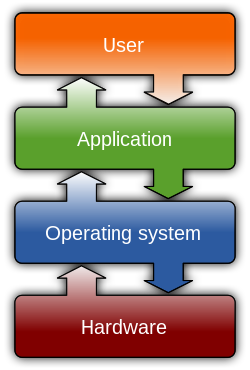Shortest job next (SJN), also known as shortest job first (SJF) or shortest process next (SPN), is a scheduling policy that selects for execution the waiting...
4 KB (424 words) - 14:34, 2 May 2024
Shortest remaining time, also known as shortest remaining time first (SRTF), is a scheduling method that is a preemptive version of shortest job next...
3 KB (298 words) - 19:57, 3 November 2024
ratio next (HRRN) scheduling is a non-preemptive discipline. It was developed by Brinch Hansen as modification of shortest job next or shortest job first...
2 KB (397 words) - 00:48, 8 September 2023
either model. Shortest job first The next job to be served is the one with the smallest size. Preemptive shortest job first The next job to be served is...
39 KB (4,807 words) - 21:32, 19 June 2025
giving each job a time slot or quantum (its allowance of CPU time), and interrupting the job if it is not completed by then. The job is resumed next time a...
7 KB (939 words) - 09:10, 16 May 2025
shows an average of nine jobs waiting to be serviced. Add one for the job being serviced, so there is an average of ten jobs in the system. Another meter...
16 KB (1,827 words) - 06:18, 2 June 2025
make_shared<Node>(_value); back = front; } else { back->next = make_shared<Node>(_value); back = back->next; } } T dequeue() { if (front == nullptr) throw...
8 KB (975 words) - 04:19, 19 May 2025
a single server, where arrivals are determined by a Poisson process and job service times have an exponential distribution. The model name is written...
14 KB (1,841 words) - 18:43, 26 February 2025
network Service policies FIFO LIFO Processor sharing Round-robin Shortest job next Shortest remaining time Key concepts Continuous-time Markov chain Kendall's...
8 KB (924 words) - 05:31, 12 January 2025
Germany; see List of railway stations in Frankfurt Shortest job next, or shortest process next Service Principal Name (SPN), used in the Kerberos protocol...
2 KB (266 words) - 09:49, 23 May 2025
context switch, and the code for the interrupt is loaded and executed. The job of a FLIH is to quickly service the interrupt, or to record platform-specific...
13 KB (1,799 words) - 05:59, 15 April 2025
creates a pipeline where the output of one command becomes the input to the next command. On some systems, such as Unix-like systems or Windows, one can modify...
76 KB (8,636 words) - 21:26, 9 July 2025
feedback queue Rate-monotonic scheduling Round-robin scheduling Shortest job next Shortest remaining time Top-nodes algorithm: resource calendar management...
72 KB (7,951 words) - 17:13, 5 June 2025
completes preemptive shortest job first where at any moment in time the job with the smallest original size is served shortest remaining processing time...
14 KB (1,787 words) - 11:53, 30 June 2025
triggering method, the processor will begin interrupt processing at the next instruction boundary following a detected trigger, thus ensuring: All instructions...
46 KB (5,726 words) - 14:31, 9 July 2025
solve the approximate systems.: 201 In a G/G/2 queue with heavy-tailed job sizes, the tail of the delay time distribution is known to behave like the...
6 KB (622 words) - 07:20, 8 December 2024
technique can be used to approximate other scheduling algorithms, such as Shortest job next and Fair-share scheduling. Lottery scheduling solves the problem of...
3 KB (267 words) - 18:51, 4 May 2025
Process control block Real-time Thread Time-sharing Scheduling algorithms Fixed-priority preemptive Multilevel feedback queue Round-robin Shortest job next...
1 KB (148 words) - 19:29, 26 March 2024
network Service policies FIFO LIFO Processor sharing Round-robin Shortest job next Shortest remaining time Key concepts Continuous-time Markov chain Kendall's...
2 KB (285 words) - 23:36, 7 April 2024
network Service policies FIFO LIFO Processor sharing Round-robin Shortest job next Shortest remaining time Key concepts Continuous-time Markov chain Kendall's...
4 KB (454 words) - 00:22, 9 May 2025
to zero. To find the stationary probability distribution vector, we must next find φ {\displaystyle \varphi } such that φ S = φ , {\displaystyle \varphi...
23 KB (4,240 words) - 02:41, 27 June 2025
parameter μ. If there are fewer than c jobs, some of the servers will be idle. If there are more than c jobs, the jobs queue in a buffer. The buffer is of...
15 KB (2,183 words) - 14:59, 20 December 2023
International Conference on Emerging Networking Experiments And Technologies. CoNEXT '19. New York, NY, USA: Association for Computing Machinery. doi:10.1145/3359989...
17 KB (1,701 words) - 14:10, 11 July 2025
where K is the capacity of the queue, N is the size of the population of jobs to be served, and D is the queueing discipline. When the final three parameters...
9 KB (645 words) - 05:47, 12 July 2025
more than one. There are numerous approximations for the average delay a job experiences. The first such was given in 1959 using a factor to adjust the...
12 KB (1,314 words) - 21:56, 19 February 2025
Poisson process, there are infinitely many servers, so jobs do not need to wait for a server. Each job has an exponentially distributed service time. It is...
7 KB (946 words) - 02:08, 2 October 2024
network Service policies FIFO LIFO Processor sharing Round-robin Shortest job next Shortest remaining time Key concepts Continuous-time Markov chain Kendall's...
7 KB (912 words) - 04:12, 30 March 2025
a single server, where arrivals are determined by a Poisson process and job service times are fixed (deterministic). The model name is written in Kendall's...
10 KB (1,522 words) - 14:59, 20 December 2023
SJN may refer to: Shortest job next, a scheduling policy ISO 639-3 code for Sindarin, a fictional language devised by J. R. R. Tolkien This disambiguation...
173 bytes (56 words) - 14:18, 13 December 2021
network Service policies FIFO LIFO Processor sharing Round-robin Shortest job next Shortest remaining time Key concepts Continuous-time Markov chain Kendall's...
5 KB (686 words) - 06:51, 10 May 2024











